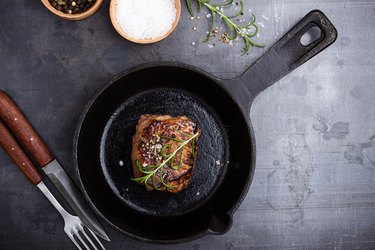
Cast iron skillets are incredibly versatile — you can use them on top of the stove as well as in the oven — and perfect for cooking many dishes from stir-fries to roast chicken to a pan-sized chocolate chip cookie. Try seasoning cast iron with coconut oil to keep your skillet in good working order.
Season Cast Iron
Video of the Day
It's recommended that you season (or in other words, prepare) cast iron skillets and pans before their initial use, Michigan State University Extension advises. The best way to season cast iron is by baking a coat of oil onto the iron to prevent rust and to help give the cooking surface an easy-release finish. It's worth noting that cooking in cast iron can add needed iron to your diet, according to Columbia University's Go Ask Alice.
Video of the Day
You may use any oil or fat to season your cast iron skillet, but the best oil for cast iron cooking is one with a high smoke point, such as vegetable or canola oil.
Seasoning is meant to be performed when you have acquired a new cast iron skillet or are restoring an old one that is no longer fully seasoned. You may also re-season your pan if you notice food sticking to it or at any sign of rust.
Seasoning With Coconut Oil
You can also choose to try seasoning cast iron with coconut oil. If you use coconut oil you'll want to go with refined coconut oil, which the Harvard T.H. Chan School of Public Health notes has a smoke point of about 400 to 450 degrees Fahrenheit (as opposed to unrefined coconut oil, which has a lower smoke point). Refined coconut oil also has less of an overt coconut flavor.
For general maintenance and cleaning, a cast iron skillet should be cleaned immediately after use (don't let it soak in water and soap in the sink or it could rust). Use hot water and a sponge or stiff brush to scrub out your pan and do not use soap.
If there is any remaining food stuck to your skillet after you've cleaned it, scrub the pan with a paste of kosher salt mixed with water, then rinse clean. You may also try removing food debris by boiling water in the pan.
Season the Right Way
A general guide to seasoning cast iron with coconut oil — or any other oil — is as follows:
First, preheat the oven to 350 degrees Fahrenheit. While the oven is heating, wash the skillet with warm soapy water using a sponge or a dish scrubbing brush. Make sure to well clean off any old food that may be stuck to the skillet. Note that cast iron should not usually be washed with soap but for an initial seasoning it is fine to do so.
Rinse the soap off and dry the skillet with a clean, dry cloth. Pour a little liquid coconut oil, about 1 teaspoon, into the skillet. (You may need to warm your coconut oil if it has solidified.)
Using a clean, dry cloth or paper towel, rub the oil into the surface of the skillet, making sure to coat the bottom and sides thoroughly. Also, rub oil around the outside surface of the skillet, including bottom and sides.
Place the skillet upside down on the oven's center rack. Place a sheet of aluminum foil or a baking pan on the rack underneath to catch any drips. Bake for an hour. After an hour, turn off the oven and let the skillet cool completely before you remove it from the oven.
A well-seasoned skillet has a shiny, smooth, nonstick surface. If food starts sticking to the surface or the skillet appears dull, it's time to re-season the skillet.